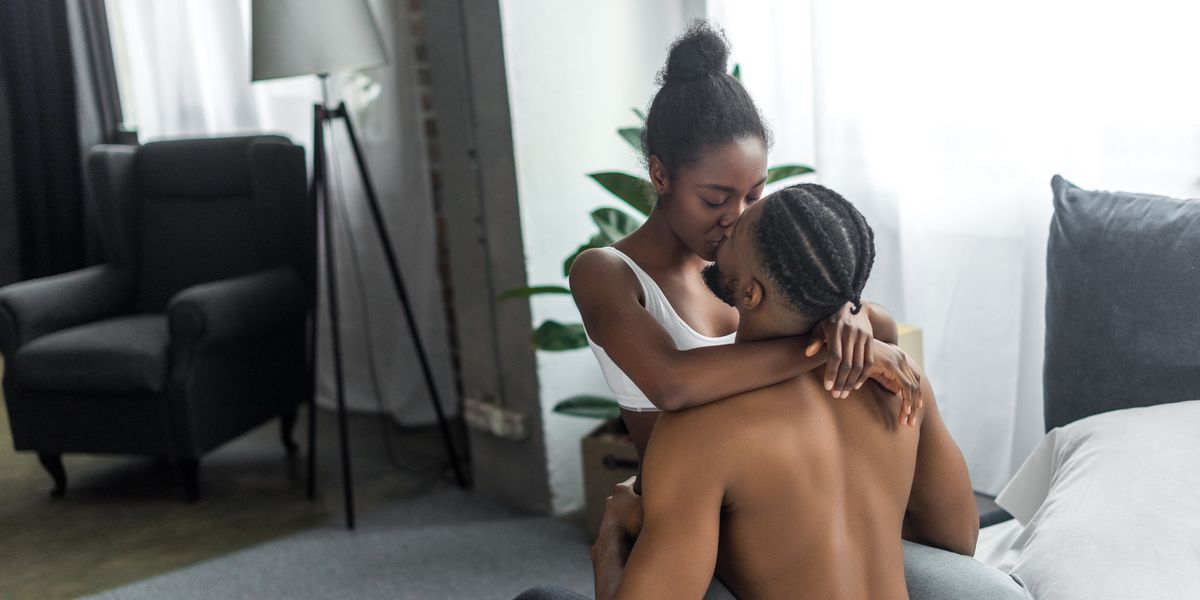
Make-Up Sex Might Be Doing Your Relationship More Harm Than Good
Whether you ever intended on watching Tyler Perry's Why Did I Get Married? and Why Did I Get Married Too?, for better or for worse, BET doesn't really give you much of a choice. It seems like at least once a week, one or both films are airing on that channel. And, if there's a couple that is truly memorable, it's Marcus (played by Michael Jai White) and Angela (played by Tasha Smith).
To call them "dysfunctional" would be a major understatement. They have serious trust issues, their communication sucks, there's little to no respect given, they seem to find extreme pleasure in throwing each other under the bus in front of their friends (especially Angela) and they appear to get on each other's last nerve, more times than not.
I've seen clips of both movies so much that they both seem to run in together at this point. But I do know for sure that, in one of them, there's a scene where Marcus is asked why he keeps putting up with all of the crazy. His response? "The make-up sex is insane!" (or something along those lines).
That's not just a line from a movie. If you put "make-up sex" in any search engine, you're gonna see articles about why so many of us like—no, LOVE—it. From the research that I've done on the topic, a lot of us are super into make-up sex because it tends to be wilder, more exciting and more intense than so-called "regular sex" is. That's cool. But like most things in life, there is such a notion as too much of a good thing.
How can you tell the difference between make-up sex being a hot way to conclude a fight vs. something that is masking a layer of issues that sex alone really can't solve? I've got five points that can at least get you on the path of seeing what's really going on in your bedroom—and ultimately, your marriage.
Is Make-Up Sex How You Always “Resolve” Arguments?

Personally, whenever a couple tells me that they never argue, whether they say it directly on my face or not, I'm giving them the side-eye. While I don't think that every couple has ugly knockout drag-outs, I find it very hard to believe because if two people are being open and honest with one another, sometimes boats are gonna get rocked. And there's nothing wrong with that. We all have our own way of seeing things and oftentimes, looking at another's perspective is just what we need in order to grow as individuals.
The problem with arguing is when a couple has no idea how to resolve their issues when they arise. If there is a lot of grudge-holding, deflecting, hitting below the belt, yelling and screaming or even a ton of passive aggressiveness, not only does this reveal poor communication skills, it will only make matters worse over time.
What really needs to be addressed is the fact that some couples are either so used to arguing that they don't realize how unhealthy their communication is or they are so accustomed to having sex to "fix matters" that, ironically, nothing really ever gets fixed.
I'm big on saying that sex shouldn't be about "making love" so much as celebrating it.
Along these same lines, make-up sex shouldn't be about avoiding resolutions but the celebration of actually coming to one. Which is it for you and yours?
Is Make-Up Sex a Stress Coping Mechanism?

Life has its stress-filled moments. There's no doubt about that. And when it comes to the health benefits of sexual activity, the reduction of the stress hormone cortisol is a strong one. So yeah, I totally get why couples would resort to having sex in order to release a little anxiety and tension. That's not why I'm bringing this point up, though.
It's one thing to have a few days when your schedule has you feeling overwhelmed or to receive some news that's got you a little more than just irritated. It's another to be sick all of the time, an insomniac or noticing things like body aches and hair fall. If these things are transpiring, they're usually red flags that you are too stressed for your own good and all sex is doing is masking a deeper issue.
Sure, sex can distract you for a few minutes (or, if you're lucky, a couple of hours), but the problems are gonna still be there when you're done. If all you really do to handle your stress is having sex, that's something else to really look into; preferably with a therapist and/or physician.
Is Make-Up Sex the Only Time That You Truly Feel Connected?

So, there is such a thing as arousal transfer. What's that? In a nutshell, it's when our bodies go from one kind of stimuli to another and then we pass it on to someone else. In the context of make-up sex, it's basically going from an emotion like anger to another like excitement. Then, when pleasure is brought into it all, it can create the illusion that reconciliation has happened when really all that's gone down is you connected on a physical level (and the oxytocin calmed you down a bit).
Arousal transfer is normal, but if it's the only time you and your partner truly feel like you're on the same page, it's also an illusion. Healthy relationships have mental, emotional and spiritual connections not just physical ones. Healthy couples are able to feel close to one another, whether sex comes into play or not.
Is Make-Up Sex What You Do When You Don’t Know What to Do?
 Giphy
GiphyA lot of us were not fortunate enough to grow up in a two-parent household and/or one that consisted of two people who loved and respected each other and communicated well. Because this was lacking, we didn't really get the foundational skills required to deal with conflict in a romantic relationship.
Two things typically happen because of this. One, we (internally) freak out whenever relational issues arise and/or two, we either think that running from the relationship or doing whatever makes our partner feel better is the solution. And oftentimes, that feel-good-remedy is sex.
The problem with that is even the best (and most realistic) sex only lasts a couple of hours. Once it's over, the problems still exist. If you and yours are always having sex during or immediately following a fight because you don't know what else to do, this is another reason to strongly consider getting into some marital counseling. Just so the two of you can learn how to hash things out and "fight fair" in the process.
Is Make-Up Sex How You “Handled” Relationships When You Were Dating Too?

There is a lot of baggage that many of us bring into our current relationship, oftentimes not realizing it until we get triggered or a particular pattern is brought to our attention. That said, if you can relate to all of what I shared here and a part of you is wondering where it came from, take a brief walk down memory lane to see if make-up sex is how you handled issues with your boyfriends as well.
A huge mistake that a lot of people make in relationships is assuming that what they did in their dating situations won't creep into their marriage. The only way you can be sure of that is by taking the time, as a single person, to do some self-evaluating and healing. If you're just now seeing that make-up sex has been your modus operandi all along, ask yourself two things—1) how did it work for you back then and 2) if it wasn't a big deal, why aren't you still with your exes? Hmm.
Again, make-up sex isn't a bad thing. Not at all. But if you're dependent on it in order to get through the hard/bad times in your marriage, be careful. You might look up and discover that it didn't fix anything. It just bought you more time to not deal with the inevitable—some real serious problems in your relationship.
You might discover that sex was more like icing on a garbage lid than anything. Sweet for a second but what was underneath? Eww.
Featured image by Getty Images.
Related Articles:
Maintenance Sex Could Be The Key To A Successful Marriage - Read More
8 Things You Should Do Daily To Keep Your Relationship Strong – Read More
7 Things Married Couples Do To Damage Their Sex Lives – Read More
5 Reasons Why Every Married Couple Needs A Sex Jar – Read More
- Learn To Fight Fair In Your Marriage - xoNecole: Women's Interest, Love, Wellness, Beauty ›
- How To Argue In Healthy Way In Relationships - xoNecole: Women's Interest, Love, Wellness, Beauty ›
- Sex Is Great But The Relationship Is Bad - xoNecole: Women's Interest, Love, Wellness, Beauty ›
Different puzzle pieces are creating bigger pictures these days. 2024 will mark a milestone on a few different levels, including the release of my third book next June (yay!).
I am also a Professional Certified Coach. My main mission for attaining that particular goal is to use my formal credentials to help people navigate through the sometimes tumultuous waters, both on and offline, when it comes to information about marriage, sex and relationships that is oftentimes misinformation (because "coach" is a word that gets thrown around a lot, oftentimes quite poorly).
I am also still super devoted to helping to bring life into this world as a doula, marriage life coaching will always be my first love (next to writing, of course), a platform that advocates for good Black men is currently in the works and my keystrokes continue to be devoted to HEALTHY over HAPPY in the areas of holistic intimacy, spiritual evolution, purpose manifestation and self-love...because maturity teaches that it's impossible to be happy all of the time when it comes to reaching goals yet healthy is a choice that can be made on a daily basis (amen?).
If you have any PERSONAL QUESTIONS (please do not contact me with any story pitches; that is an *editorial* need), feel free to reach out at missnosipho@gmail.com. A sistah will certainly do what she can. ;)
ItGirl 100 Honors Black Women Who Create Culture & Put On For Their Cities
As they say, create the change you want to see in this world, besties. That’s why xoNecole linked up with Hyundai for the inaugural ItGirl 100 List, a celebration of 100 Genzennial women who aren’t afraid to pull up their own seats to the table. Across regions and industries, these women embody the essence of discovering self-value through purpose, honey! They're fierce, they’re ultra-creative, and we know they make their cities proud.
VIEW THE FULL ITGIRL 100 LIST HERE.
Don’t forget to also check out the ItGirl Directory, featuring 50 Black-woman-owned marketing and branding agencies, photographers and videographers, publicists, and more.
THE ITGIRL MEMO

I. An ItGirl puts on for her city and masters her self-worth through purpose.
II. An ItGirl celebrates all the things that make her unique.
III. An ItGirl empowers others to become the best versions of themselves.
IV. An ItGirl leads by example, inspiring others through her actions and integrity.
V. An ItGirl paves the way for authenticity and diversity in all aspects of life.
VI. An ItGirl uses the power of her voice to advocate for positive change in the world.
Let’s make things inbox official! Sign up for the xoNecole newsletter for daily love, wellness, career, and exclusive content delivered straight to your inbox.
Navigating Dating When Emotionally Unavailable & Detached: My Journey Back To Feeling
The last time I came with a dating story, I told you I got my little feelings hurt in 2021. I called myself trying to be out in these streets entertaining a man in a different area code, city, and state — only for homeboy to play in my damn face. So, I went and gave y’all "8 Rules To Casual Dating Every Woman Should Know This Summer." You’re welcome. Fast forward to 2024, and I am now coming to you from a more mature and intentional place. We’re not in summer yet, but I truly believe what blooms in spring, thrives in summer.
2023 was my year, and it was my turn. I had just completed an 8-month holistic detox. The glow-up was real and well-deserved. The way I have poured into myself is unmatched. Let me tell you, self-love is a love you have never known. After a five-year healing journey, I finally felt like myself again, and I was ready to play. My heart was open, my mind was clear, and my body hella transformed. I had told all my friends that I was ready to explore dating again, and at the height of summer, I did exactly just that.
This time I decided I wanted to take my time. I wanted to date the “right way” or the “healthy way.” You know, keep your options open, ask the right questions, believe actions and not words, observe patterns and pay attention to red, yellow, and green flags. I was never the dating app type of girl. I sincerely miss everything about human connection and dating from 2000 to 2012. Can we please bring all of that back into 2024? I prefer to feel a man’s energy and presence in real-time. Nonetheless, I still chose to dabble with a few dating apps. I was all the way outside and dating for practice.
Unfortunately, with today’s dating culture, social climate, and how some of these men move and/or behave, these dates were a dead end. Not one guy made it to my roster. What these men were was benched this season – not one of them could be my first-round select draft pick. It didn't seem like anyone I met was interested in a serious relationship. And it’s completely fine. Miss me with the ghosting, lack of effort, inconsistency, and poor communication. I continued to just do me because what is for me will not miss me.

Kelvin Murray/ Getty Images
The universe must have heard me talking because I had specifically told my closest girlfriends that I wanted to meet someone who lived in the vicinity, no more than twenty minutes away, and no more long distance. And I did meet him (it’s crazy how I manifest exactly what I want). As we started to get to know each other, I liked his energy and effort. I liked the direction it seemed to be going to the point my girlfriends had to tell me not to run from him. Because every part of me wanted to run from something that seemed normal.
I liked what he was coming with until I became uncomfortable with my own feelings, and I didn’t know how to communicate them to him.
With that said, I knew if I truly wanted to experience the truest of loves, a reciprocal, requited love, and be in a healthy relationship this story had to come to a pause. What I didn’t know was that he was going to show me things I didn’t know I needed to work on. I didn’t know he inadvertently was going to help me continue to heal parts of me that were hidden.
As someone who has learned to self-heal, I am no longer the type that runs from herself. I am here for the growth.
The truth is I am emotionally detached from myself, and I am not actively dating at the moment. I am the one that has to work on herself. My reiki healer called it, too – she told me this year would not be a year for a relationship, but a year of continuous growth. And now I see why. After all the healing work I have done thus far – I am an unemotional mess. How?
At my big age of 39, I struggle to communicate my wants and needs.
I still struggle to communicate and process uncomfortable feelings. I would rather give myself anxiety, act nonchalantly, emotionally react, and choose non-communication when I am bothered with someone than address the issue (I will later explain why). I have been ignoring my feelings for so long it has become a habit, a defense mechanism, and more so a trauma response.
If you are someone like me who grew up in a household that didn’t discuss feelings, your emotional needs were unmet, and you don’t feel safe to share your feelings – emotional detachment is quite common.
Oftentimes, we always talk about men being emotionally unavailable, but what if it’s a woman who is emotionally unavailable or emotionally detached? How does she navigate herself, dating, or being in a relationship? As I navigate my emotions this season, let’s explore what it means to be emotionally detached, the signs of detachment, and how to reconnect with yourself emotionally.
Emotional Unavailability vs. Emotional Detachment
When we look at the terminology emotional unavailability and emotional detachment, one might argue that the two terms are interchangeable and have the same meaning. One could also argue that both terms mean that some people are not in tune with their emotions or lack the emotional capacity to be responsive to someone else’s emotions. Fair enough. However, there is a big difference. The definition of emotional unavailability is described as people who have difficulty with sharing their emotions and being receptive to the emotions of those around them.
According to Verywell Mind, signs of emotional unavailability can look like being distant or cold, lack of closeness, and emotional intimacy in relationships, inability to understand and relate to others’ feelings, defensiveness when asked to change or let others in, tendency to shut down or avoid topics that require emotional openness, or withdrawal from people or situations that provoke emotional reactions.
 GIF by Kim's ConvenienceGiphy
GIF by Kim's ConvenienceGiphyWhereas emotional detachment is defined as the inability to or willingness to connect with others on an emotional level. Furthermore, Psychology Today states emotional detachment can also mean that people do not engage with their feelings. Exhibit A – me. Emotional detachment has various causes – past neglect, childhood or adult trauma, PTSD, depression, personality disorder, bipolar disorder, substance abuse, or, in some cases, medication (i.e. antidepressants). It is important to note emotional detachment is a complex issue. For someone like me, it’s a coping mechanism.
It is easier for me to ignore uncomfortable feelings to protect myself from stress or getting hurt. Hence, my nonchalant demeanor. It is also true for some people it is a reaction to trauma, abuse, and unprocessed emotions. Exhibit B – me. As it is difficult for me to open up about my feelings at the moment. On the contrary – emotional detachment can be helpful in navigating some situations like listening to people’s opinions and gossip.
Unfortunately, emotional detachment is not a behavior that can be turned on and off at will. Please note that emotional detachment is NOT a mental health diagnosis but can be a symptom of a mental health condition such as an attachment disorder. And if you know anything about attachment theory, it is related to the relationship we develop in our childhood with our primary caregivers.
Signs You're Emotionally Detached

Mavocado/ Getty Images
According to Psychology Today and Verywell Mind, general signs of emotional detachment can look like difficulty showing empathy to others, sharing emotions, committing to a relationship, feeling numb, poor listening skills, lack of self-esteem, preferring to be alone, struggling to feel positive emotions, inability to identify emotions, lack of physical, verbal, or sexual contact and losing touch with people or maintaining connections.
In a romantic relationship, emotional detachment shows up as you or your partner not being available for connection, poor communication, or reduced affection.
For me, my experience with emotional detachment is collective. I am an empath to my core. I don’t have a problem relating to other’s feelings or circumstances. I don’t have commitment issues, nor do I have an issue connecting with others or maintaining those connections. I struggle with sharing emotions, at least the negative ones.
Due to the emotional abuse from my childhood and a toxic relationship, I learned sharing emotions just wasn't the safe thing to do. As a survivor of trauma, I learned to suppress feeling negative emotions in general as a form of protection.
How To Reconnect To Your Emotions When You're Emotionally Unavailable
 Serious Kid Cudi GIF by Apple MusicGiphy
Serious Kid Cudi GIF by Apple MusicGiphyExploring my emotional side in-depth started late last year simply by noticing my reaction to something that he did. I didn’t know how to properly communicate to him how I was feeling or what he did bothered me in the moment. So, I swallowed my feelings and said absolutely nothing. I intentionally chose to avoid the issue. I chose to rationalize the situation instead of acknowledging that my feelings at the time were valid. I chose to act like everything was all good because it was all good.
“It wasn’t that deep to begin with” is what I told myself. And this is where the problem lies.
The saying is true, “What happens in your childhood shows up in your adult relationships.” I came to realize that because I was not able to express my feelings as a child, I struggled to process them. I either hold back my feelings, take a long time to say how I feel, or don’t say anything at all. This is because I fear people will walk away from me like my mother did if I share what I truly feel. I fear my feelings won’t be validated, or they will be rejected.
With that said, I was completely unaware that I was emotionally detached from myself until recently. So, here we are with this article. It all started by reading Instagram’s @theholisticpsychologist, Dr. Nicole LePera’s newest book How to Be the Love You Seek: Break Cycles, Find Peace, and Heal Your Relationships, which was released on November 28, 2023. As I read through the first chapter, I became triggered.
How Dr. LePera describes her childhood with her parents and experiences with her romantic partners somewhat mirrored my experiences with my own parents and relationships. As Dr. LaPera stated in her book, I have no issue showing up for others or meeting their needs and wants. But when it comes to expressing my own needs and wants – I cannot or I don’t. This is mainly due to my hyper-independence.
At an early age, I learned to show up for myself because the people I trusted to show up for me failed. Given my home environment, I had internalized it is not safe to talk about feelings. I never knew my emotional responses and behavior were abnormal. But because I am willing to continue to do my inner work, I know that I can reconnect to my emotions, and undo four decades of repressed emotions.
If you are someone like me who struggles with emotional connection with yourself and others, here is how you go about it:

Lighthouse Films/ Getty Images
1. Know Your Attachment Style
For me, the first step was to understand my attachment style. I asked my therapist if she could help me identify my attachment style to understand my triggers. She recommended The Attachment Theory Workbook by Annie Chen, LMFT. My therapist administered the associated online quiz – Attachment Quiz. If you haven’t figured out my attachment style yet by reading this article, I have an anxious attachment style.
This means I don’t do well with inconsistent behavior, especially from men (but I’m the type that holds men to standards too). People with an anxious attachment style have a need to feel close to their partner. It may come across as “clingy” or “needy.” However, this same need is often driven by fear of abandonment, mistrust, and low self-esteem. I would say knowing your attachment style is helpful because you can work towards having a secure attachment style (with practice) in your relationships – familial, business, work, platonic, or romantic.
2. Become Self-Aware
Most people who are not in the practice of self-care or self-healing are unaware of their triggers, patterns, and behaviors. We are so caught up in the daily minutiae of life that we forget to pay attention to the most important part of our days — ourselves. As Dr. LePera says, make it a conscious habit to pause throughout your day to check in with yourself. Ask yourself:
- How does my body feel?
- What am I doing right now?
- Am I present?
- Am I distracted and lost with other thoughts?
- What do I think or feel when I recall a specific experience with someone?
- What do I think or worry about?
- What would happen if I shared my authentic thoughts, perspective, feelings right now?”
This is what Dr. LePera refers to as exploring your embodied self or fulfilling your authentic needs in chapter two of her book. Consistent mindfulness and self-awareness are key to self-discovery and in any healing journey. Learning to focus on the present moment also includes paying attention to our emotional response to an event or how we think about emotions in general.
3. Practice Vulnerability
The idea of vulnerability is a tough one for me and so many other women for countless reasons. Whether it be toxic family, friendships, relationships, or trauma – trusting others with your thoughts and feelings is not easy. As much as I am open and transparent, I am not as vulnerable. And I believe there is so much power in the duality to be both. To trust someone, let alone a man with your authentic self is a delicate matter.
But it is emotional vulnerability that allows us humans to build authentic connections, create stronger relationships, and break down emotional walls. Emotional vulnerability is not something to be rushed – it takes time and practice from you and the people you choose to have in your life. Medical News Today suggests that we can learn to be vulnerable by opening up more to our closest friends, building our ability to become more trusting, and developing skills to regulate our emotions.
4. Seek Therapy
I have been in therapy for six years and counting. I would consider therapy one of my safe spaces. I am one of those individuals who recommend therapy to everyone as it has given me the tools and resources I need to navigate my life challenges. By choosing to get help, I was able to put my PTSD and depression in remission for four years now. I have also learned how to manage my anxiety.
I am fully aware that in this season of my life requires me to do the work to unlock new levels of self. And any time where I have consciously chosen growth – the universe or life has not failed me. I was able to heal my body, my heart, and my spirit. Now, it’s time to heal my inner child, this hurt little girl who lives in me.
I will say choosing a therapist is similar to dating; you might go through a few potentials until you find a therapist you connect with. Actually, one of my lifelong friends said to me the other day, “Your relationship with your therapist is one of the most important relationships in your life.” I needed her to say that, and I needed to hear it because it’s true. You are essentially trusting a licensed stranger to help you navigate your life on so many levels.
Be picky and ask the questions. Cut the cord at the first red flag given. Again, let me reiterate that emotional detachment is not a mental health diagnosis. It can be treated with the help of a therapist. Emotional detachment only becomes a problem when it starts to interfere with your daily life. Pay attention to changes in your daily behavior and make decisions to cope accordingly.
I am genuinely excited about reconnecting with my emotions. I want to feel all the feels – good, bad, and indifferent. I want to cry all the tears – especially the sad ones. I want to process and release negative emotions. I want to say how I feel in the moment with no fear.
If you are that girl who struggles with emotional connection or thinks you're emotionally detached, I hope that you become willing to face your inner child and show up for her. Don’t run – she has been waiting for you.
Let’s make things inbox official! Sign up for the xoNecole newsletter for daily love, wellness, career, and exclusive content delivered straight to your inbox.
Feature image by fizkes/ Getty Images










